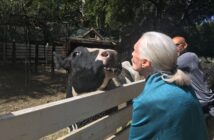How could we have ever believed that it as a good idea to grow our food with poisons. – Dr. Jane Goodall
To celebrate the end of Non-GMO month, we are excited to share the below excerpt from Dr. Jane Goodall’s book, Seeds of Hope: Wisdom and Wonder from the World of Plants, published by Grand Central Publishing, a branch of Hachette Book Group. To read more about Dr. Goodall’s findings on GMOs and to take the journey with her as she discovers some of the most amazing things about trees and other plants, be sure to pick up a copy of her latest book.
The most recent monstrous crime against plants – at least in my view – is the tinkering with their DNA. One example is the insertion of bacterial genes into the DNA of plants so that they produce proteins toxic to insect pests. The era of biotechnology has begun. For me, born in 1934 – before TV, before computers, before the landing on the Moon – the creation of genetically modified (BM) crops is another example of science fiction become reality.
Of course, when this new technology was introduced to the agricultural world, the gradual erosion of traditional farming methods – which began with the introduction of monoculture crops and chemical fertilizers, pesticides, and fungicides – sped up. When I was gathering facts for my book Harvest for Hope, I talked to many people about genetically modified organisms (GMOs), people on both sides of what has become a hugely contentious issue. Proponents spoke of the benefits in glowing terms. Now there will be no need for spraying our fields with noxious chemical pesticides – the plants themselves will kill any pest that dares sample a forbidden leaf. Designer-crop plants are tolerant of chemical herbicides, so we can spray the fields and kill the weeds with those chemical without harming our harvest. And as the globe heats up, GM drought-resistant plants will continue to thrive. Yields will increase. The farmers will benefit. The environment will benefit. Hooray! Science can solve the problem of providing enough food for the ever-expanding human population.
Alas! Such hopes have proved as insubstantial as the pipe dreams of the opium smokers – although the GMO giants such as Monsanto, DuPont, Syngenta, Dow Chemical, BASF, and Bayer would have us believe otherwise. They clearly think that if we are told often enough that GM crops are the solution to the world’s agricultural problems, we will believe it. However, since 1996, when Monsanto first commercialized Bt corn, a growing chorus of voices has been pointing out the downside of this technology.
This chapter is perhaps the most controversial of this book and one I feel the most passionate about. The information here is based on as much published material and as many studies as I have managed to read. This chapter is also based on personal conversations with the many scientists, farmers, and concerned citizens I have met during my travels around the globe. One of those people is public interest attorney Steven Druker, who obtained files on genetically engineered foods only by winning a lawsuit he filed against the FDA. He has spent the past eight years working on his upcoming book, Altered Genes and Twisted Truth: How the Venture to Genetically Engineer Our Food Has Subverted Science, Corrupted Government and Systematically Deceived the Public. Steve and I have talked extensively and he shared some of his findings with me. Some of this information was shocking.






